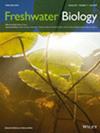Do Mouth-Infecting Parasites Alter the Foraging Ecology of Host Fish? A Test With the Parasitic Copepod Salmincola markewitschi and White-Spotted Charr Salvelinus leucomaenis
IF 2.8
2区 生物学
Q2 ECOLOGY
引用次数: 0
Abstract
- Many parasites infect host mouth cavities and are expected to physically impede host foraging. Despite these potential impacts, few studies have evaluated host foraging activities and their findings are equivocal.
- We examined the effects of the mouth-infecting copepod, Salmincola markewitschi, on wild white-spotted charr Salvelinus leucomaenis foraging using stomach contents analysis. Because the mouth-infecting copepod occupies a large space in the host mouth cavity, we hypothesized that infected fish exhibit reduced stomach fullness and total prey consumed compared to uninfected fish. In addition, we also hypothesized that infected fish shift their main diets from terrestrial to aquatic invertebrates because parasites reduce host activity, body condition and competitive ability.
- Contrary to our predictions, stomach fullness and total prey consumed were not significantly different between infected and uninfected fish: smaller infected fish consumed more prey. We also found that smaller infected hosts foraged on a lower proportion of terrestrial invertebrates than their uninfected counterparts.
- Our results suggest that small infected fish increased foraging activities to compensate for energetic loss induced by infection. They also shifted their diet from large terrestrial to small aquatic invertebrates, possibly due to physical impediments and reduced competitive abilities associated with copepod infection.
- Our study indicates that mouth-infecting parasites affect host foraging ecology, but the impacts are weaker than expected and depend on host body size. Nonetheless, behavioural shifts could have important ecological consequences such as loss of host fitness and strengthening trophic cascades in aquatic ecosystems.
口腔感染寄生虫会改变宿主鱼的觅食生态吗?寄生桡足类市场沙蚤和白斑沙蚤的鉴定
许多寄生虫感染宿主的口腔,预计会在物理上阻碍宿主的觅食。尽管有这些潜在的影响,很少有研究评估宿主的觅食活动,他们的发现是模棱两可的。利用胃内容物分析方法研究了口腔感染桡足动物Salmincola markewitschi对野生白斑鲑(Salvelinus leucomaenis)觅食的影响。由于感染口腔的桡足类在宿主口腔中占据了很大的空间,我们假设与未感染的鱼相比,感染的鱼表现出胃饱腹感和总猎物消耗减少。此外,我们还假设受感染的鱼类将其主要饮食从陆地转向水生无脊椎动物,因为寄生虫降低了宿主的活动,身体状况和竞争能力。与我们的预测相反,胃饱度和总猎物消耗在感染和未感染的鱼之间没有显着差异:较小的感染鱼消耗更多的猎物。我们还发现,与未感染的宿主相比,较小的感染宿主捕食陆生无脊椎动物的比例较低。我们的研究结果表明,小感染鱼增加觅食活动,以补偿感染引起的能量损失。它们还将饮食从大型陆生动物转变为小型水生无脊椎动物,这可能是由于身体障碍和与桡足类感染相关的竞争能力下降。我们的研究表明,口腔感染寄生虫对宿主的觅食生态有影响,但影响程度弱于预期,且与宿主的体型有关。尽管如此,行为转变可能会产生重要的生态后果,如宿主适应性的丧失和水生生态系统中营养级联的加强。
本文章由计算机程序翻译,如有差异,请以英文原文为准。
求助全文
约1分钟内获得全文
求助全文
来源期刊

Freshwater Biology
生物-海洋与淡水生物学
CiteScore
5.90
自引率
3.70%
发文量
162
审稿时长
2 months
期刊介绍:
Freshwater Biology publishes papers on all aspects of the ecology of inland waters, including rivers and lakes, ground waters, flood plains and other freshwater wetlands. We include studies of micro-organisms, algae, macrophytes, invertebrates, fish and other vertebrates, as well as those concerning whole systems and related physical and chemical aspects of the environment, provided that they have clear biological relevance.
Studies may focus at any level in the ecological hierarchy from physiological ecology and animal behaviour, through population dynamics and evolutionary genetics, to community interactions, biogeography and ecosystem functioning. They may also be at any scale: from microhabitat to landscape, and continental to global. Preference is given to research, whether meta-analytical, experimental, theoretical or descriptive, highlighting causal (ecological) mechanisms from which clearly stated hypotheses are derived. Manuscripts with an experimental or conceptual flavour are particularly welcome, as are those or which integrate laboratory and field work, and studies from less well researched areas of the world. Priority is given to submissions that are likely to interest a wide range of readers.
We encourage submission of papers well grounded in ecological theory that deal with issues related to the conservation and management of inland waters. Papers interpreting fundamental research in a way that makes clear its applied, strategic or socio-economic relevance are also welcome.
Review articles (FRESHWATER BIOLOGY REVIEWS) and discussion papers (OPINION) are also invited: these enable authors to publish high-quality material outside the constraints of standard research papers.
 求助内容:
求助内容: 应助结果提醒方式:
应助结果提醒方式:


